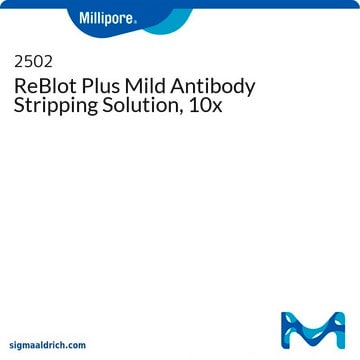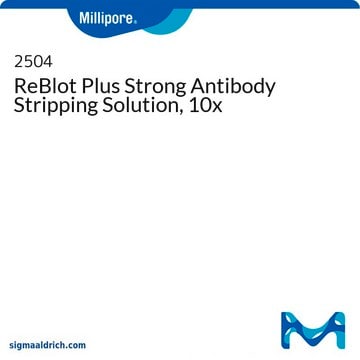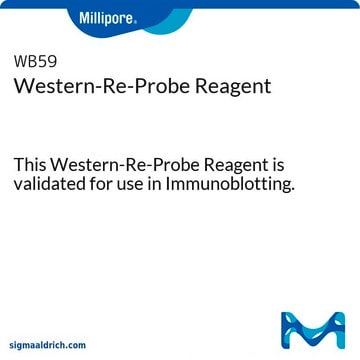About This Item
Productos recomendados
manufacturer/tradename
Chemicon®
Re-Blot™
Quality Level
technique(s)
western blot: suitable
detection method
chemiluminescent
shipped in
wet ice
General description
Stripping and reprobing of Western blots offers several advantages:
1) Conservation of samples that are expensive or available only in limited quantities,
2) Analysis of a given blot using several different antibodies, e.g. subtype- or isoform-specific antibodies,
3) Reanalysis of anomalous results and confirmation with the same or a different antibody,
4) Correcting errors in incubation with the wrong antibody,
5) Cost savings in reagents and time by reusing the same blot.
While antigen and antibody based immunoaffinity matrices, such as Sepharose™ conjugates, have been reused many times without compromising antigen-antibody reactivity, the need for pH extremes and chaotropic agents has precluded the application of these methods to Western blotting.
The MILLIPORE Re-Blot Plus Western Blot Recycling Kit contains specially formulated solutions that quickly and effectively remove antibodies from Western blots without significantly affecting the immobilized proteins.
Advantages of the Re-Blot Plus Western Blot Recycling Kit include:
- No pungent smelling β-mercaptoethanol is contained in the Antibody Stripping Solution.
- Antibody stripping is done at room temperature. No heating of blots is required.
- Blots can be stripped of antibodies in approximately 15 minutes at room temperature.
- Blots may be reused in 25 minutes.
Application
The Re-Blot Plus Western Blot Recycling Kit should be used only for qualitative purposes until it has been established by comparative blot analysis that stripping does not quantitatively affect a given antigen.
This product is for research use only; not for diagnostic or in vivo use.
Components
Strong Antibody Stripping Solution (10x) - (1 container, 50 mL).
Storage and Stability
Note: To prevent reagent degradation secure the cap tightly upon storage. Avoid extended exposure to air.
Legal Information
signalword
Danger
Hazard Classifications
Acute Tox. 3 Dermal - Acute Tox. 3 Inhalation - Acute Tox. 4 Oral - Aquatic Chronic 2 - Eye Dam. 1 - Met. Corr. 1 - Skin Corr. 1A
Storage Class
6.1C - Combustible acute toxic Cat.3 / toxic compounds or compounds which causing chronic effects
Certificados de análisis (COA)
Busque Certificados de análisis (COA) introduciendo el número de lote del producto. Los números de lote se encuentran en la etiqueta del producto después de las palabras «Lot» o «Batch»
¿Ya tiene este producto?
Encuentre la documentación para los productos que ha comprado recientemente en la Biblioteca de documentos.
Protocolos
This page shows and discusses three protocols for stripping and reprobing a western blot membrane.
Nuestro equipo de científicos tiene experiencia en todas las áreas de investigación: Ciencias de la vida, Ciencia de los materiales, Síntesis química, Cromatografía, Analítica y muchas otras.
Póngase en contacto con el Servicio técnico











